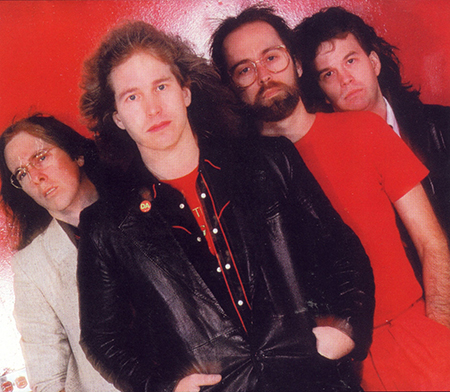Scene & Heard
HIS Dec. 1981
It was an interesting year. My secular university professor (in despair) taught that without radical actions, the Third World nations of Africa would never recover from a downward economic spiral and would slowly starve to death. The same year I read Ron Sider's Rich Christians in an Age of Hunger (IVP) while traveling to the family feast over Thanksgiving break. The turkey tasted rotten that year.
¡Alarma! is a lot like rotten turkey. It brings up all the uncomfortable issues facing Christians today. A proper response to hunger is but one of the issues explored.
The album is quite a progression for the four-man junta of southern California gospel bizarreness. The group's last effort, Horrendous Disc, marked Daniel Amos's entrance into the field of New Wave. Though a strong album musically, Horrendous Disc had little lyrical direction and owed a great deal in concept to the Beatles' Magical Mystery Tour.
With ¡Alarma! Daniel Amos has found a group identity. Their audience is believers; their lyrics are for believers. No longer do they use extreme avant-garde musical styles and general bizarreness as comedy to "laugh people into the kingdom." Instead they combine sixties California beach-music rhythms and British New Wave melodies to shock Christians out of their complacency. The band forces believers to examine their spiritual growth in a totally different light.
The Chronicles of ¡Alarma!
¡Alarma! is a concept album. The liner notes accompanying the album contain group leader Terry Taylor's first installment of the "¡Alarma! Chronicles." In Volume I, Taylor, using a surrealistic dream mode, laments the state of American evangelical Christianity. The album's songs generally follow the dream's sequence of events.
For example, in the "Chronicles" Taylor narrates about a church congregation he finds: "I felt like Alice in a horrible world of playing-card babies that took on flat, two-dimensional forms." Taylor's song "Baby Game" then echoes: "... she was so sweet once she was innocent/now she's a crib case it's all very disgusting."
The crux of the group's message in ¡Alarma! is that Christianity has become too ingrown, too comfortable. We are spiritual infants who ignore the cries of the lost. What revitalizes this tired theme is the group's bold assertion that this state of American Christianity amounts to heresy. The gospel has been lost in self-oriented, commercial, televised modern American Christianity. Sound the alarm'. The irony of the album's message is that it's being stated by a rather commercial, modern American Christian music group. Physician, heal thyself?.
Maybe. But probably not.
Acid Indigestion
Daniel Amos is not rejecting the use of modern technology or cultural trappings to present the gospel. But the group expresses the fear that many times modern technology has overshadowed the message. Only when Jesus is the focus of attention will true Christianity' be preached.
From this foundation, the true gospel can be put into action: feeding the hungry, clothing the naked and weeping with those who weep. Only when we get our hands dirty' will we see true spiritual maturity in our lives.
Best of all, ¡Alarma! does not suffer from a holier-than-thou attitude. The album ends with two songs of self-evaluation. The group members admit that they haven't arrived with all the answers to mend Christianity's woes. But they do feel compelled to sound an alarm that something is deadly wrong.
Chew this album slowly. The music is hard to listen to if you're not used to New Wave. The message might even be harder to digest. But a little rotten turkey never hurt anyone.
--Reviewed by Tom Stribling, whose one-thousand-plus album collection is the envy of all his peers.

